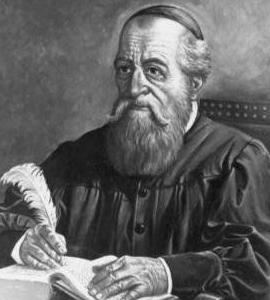Menno Simons on ... the presence of Christ in bread and wine
 In
the first place, we must take heed that we do not, as some, who make the
visible, perishable bread and wine, the Lord's real flesh and blood. To
believe this, is contrary to nature, reason and Scripture; yea, it is
open blasphemy of the Son of God, abominotion and idolatry. But as Israel
had to hold the passover annually, at the appointed time according to
the command of Moses, to commemorate that the Almighty God, the God of
Abraham, of Isaac and Jacob, did graciously preserve his people from the
punishment and plagues, when he slew the first born of the Egyptians;
and by his strong hand and outstretched arm, so gloriously and wonderfully
led them out, and redeemed them from the iron furnace of Egypt and the
dread tyranny and dominion of Pharaoh, according to the word of his promise,
and hence the paschal lamb is called the Lord's passah, that is, passover;
the sign for the reality; for the lamb was not the passover although so
called, but it only typified the passover, as said. So in the Holy Supper,
the bread is called the body, and the wine the blood of the Lord, Matt.
26: 26-28. I say the sign is put for the reality, not that it actually
is the real flesh and blood of Christ; for with that he ascended into
heaven, and sitteth at the right hand of his Father, immortal, and unchangeable,
in eternal majesty and glory; but it is an admonishing type and memorial
that Jesus Christ the Son of God has redeemed us from the power of the
devil, from the dominion of hell and eternal death, by offering up an
immaculate sacrifice, his innocent flesh and blood, and has triumphantly
led us into the kingdom of his grace, as he himself says, "This do
in remembrance of me," Luke 22:19. [pp. 41-42]
In
the first place, we must take heed that we do not, as some, who make the
visible, perishable bread and wine, the Lord's real flesh and blood. To
believe this, is contrary to nature, reason and Scripture; yea, it is
open blasphemy of the Son of God, abominotion and idolatry. But as Israel
had to hold the passover annually, at the appointed time according to
the command of Moses, to commemorate that the Almighty God, the God of
Abraham, of Isaac and Jacob, did graciously preserve his people from the
punishment and plagues, when he slew the first born of the Egyptians;
and by his strong hand and outstretched arm, so gloriously and wonderfully
led them out, and redeemed them from the iron furnace of Egypt and the
dread tyranny and dominion of Pharaoh, according to the word of his promise,
and hence the paschal lamb is called the Lord's passah, that is, passover;
the sign for the reality; for the lamb was not the passover although so
called, but it only typified the passover, as said. So in the Holy Supper,
the bread is called the body, and the wine the blood of the Lord, Matt.
26: 26-28. I say the sign is put for the reality, not that it actually
is the real flesh and blood of Christ; for with that he ascended into
heaven, and sitteth at the right hand of his Father, immortal, and unchangeable,
in eternal majesty and glory; but it is an admonishing type and memorial
that Jesus Christ the Son of God has redeemed us from the power of the
devil, from the dominion of hell and eternal death, by offering up an
immaculate sacrifice, his innocent flesh and blood, and has triumphantly
led us into the kingdom of his grace, as he himself says, "This do
in remembrance of me," Luke 22:19. [pp. 41-42]
They made the bread in the Holy Supper, into the real flesh, and the
wine into the real blood of Christ, and understood the words of Christ
literally: Take, eat, this is my body, &c., and did not observe that
Christ, John 6, does fully instruct us, how we are to eat his flesh and
and drink his blood; and says, that it would profit nothing really to
eat his flesh, and to drink his blood, for this could not be done, because
he was about ascending to heaven where he was before; we are therefore
not literally to understand this eating his flesh, and drinking his blood;
but spiritually, as he himself says, "The words that I speak unto
you, they are spirit, and they are life." All those who thus understand
this from the Scriptures, are by many, reproached as accursed heretics
and profaners of the sacrament, and must suffer for it by water, fire
and the sword. [pp. 48-49]
All excerpts are from The complete works of Menno Simon (Elkhart, Ind., 1871).